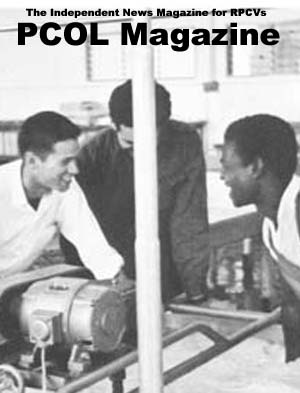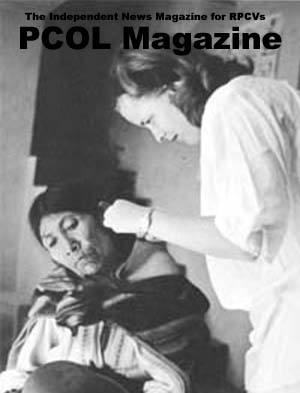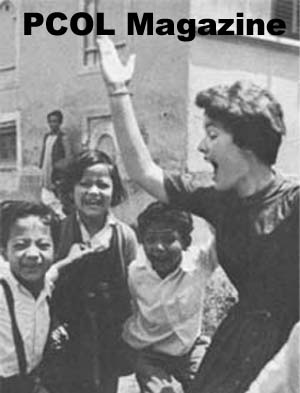
Psychology Professor Joseph Ferrari studies motives of Peace Corps Volunteers
High-risk altruists
Troubled regions of the world a draw for volunteers
By Leslie Goldman
Special to the Tribune
Published August 11, 2004
In 1997, Kathryn Chinnock was sleeping on a bus in Paraguay when she was jolted awake by armed men storming the aisles, declaring the bus hijacked. Ordered in Spanish to close their eyes, most passengers were robbed before the hijackers shot out the bus' front tires. Chinnock, who was volunteering with a city government during the transition of a new political party, was not robbed.
Such a harrowing experience might have sent even the most intrepid volunteer packing. But not Chinnock. She simply strengthened her resolve to do the work she had gone to Paraguay to do and bolstered her passion for exploring other cultures and helping in whatever way possible.
"It really was a unique experience and great for bonding, because we couldn't go anywhere for hours and everyone was praying Hail Mary after Hail Mary," Chinnock, now 33, said. "It gave me a greater insight into the situation the people of [Paraguay] were experiencing. It was a learning experience and I believe that as long as you walk away gaining some knowledge, you will become a better person."
Many might say Chinnock is fortunate she was able to walk away. Even more may find it surprising that on May 5, Chinnock and her husband left their home in Washington, D.C., to volunteer in Nicaragua for two years with the Peace Corps.
What drives women like Chinnock to volunteer in places some people would never dream of going? For one, women are, on average, more likely to volunteer than men. The U.S. Department of Labor says 32 percent of women did some sort of volunteering in the year ending September 2003, compared with 25 percent of men.
But there's a difference between donating time to a community hospital or church and spending weeks, even months, in a major international conflict area.
In March, Oklahoma lawyer Fern Holland, 33, was killed in Iraq, where she was volunteering her time to investigate human rights violations and helping to compose the women's rights section for the new constitution. Also in March, Karen Denise Watson, 38, of Bakersfield, Calif., and Jean Dover Elliot, 58, of Cary, N.C., were among five Baptist missionaries killed in a drive-by shooting in Iraq, where they were working on a water purification project.

Joseph Ferrari, a DePaul University psychology professor who has studied altruism extensively, said, in general, six motives exist--for both women and men--when it comes to volunteering. Ferrari classifies three as "selfless" motivators: The activity reflects one's values; it promotes understanding of other individuals and societies; and it enhances community-building (Chinnock, it appears, falls into these categories). The selfish motivators, according to Ferrari, fall under the umbrella of self-preservation or protection (that is, "If I get involved ... someday people will help me back," he explained ); self-esteem ("It makes me feel good to do it"); or career advancement.
Some see it as a calling
Ferrari said that although American volunteerism is on the decline overall, women tend to give of their time more often, perhaps because volunteering is considered a nurturing task or women are inherently more empathetic. He also mentioned a "Fear Factor," or thrill-seeking mentality, as well as a strong sense of spirituality as common denominators, regardless of gender.
"For some, it is a calling--a sense of vocation to serve others," Ferrari said. "One doesn't have to have a belief in God. The point is, there is some spiritual calling."
For investment banker Maria G. Medina of Glenview, it's a sense of ethnic camaraderie and volunteer team spirit that have driven her to serve overseas with an organization called Volunteers for Israel.
Medina, who is Hispanic, fell in love with Israel during a vacation and has since returned five times with VFI. She has worked on Israeli army medical bases, mopped floors and washed dishes in army cafeterias and cleaned and packaged motor parts at army warehouses. She uses her fluent Spanish to communicate with Argentinian and Mexican Jews and has been invited by soldiers to their homes for Shabbat dinners.
"At the end of the day, we're drained, but we just love it," Medina said. "I don't get my hands dirty here in the U.S. and this is dirty work and there's such partnership and teamwork between the volunteers."
Medina says her friends and large, extended family were initially shocked when they learned of her joining VFI. "They said, `You're going to help the Israeli army?' But I love the country. It's a bug, it's bitten me and the fact I can do something for that country is amazing."

Such comments are in sync with the work of Jen Lois, a sociologist at Western Washington University who has focused on gender and heroism throughout her career. Studying volunteer search and rescue groups, Lois discovered certain gender differences in how rescue workers approached risk. For instance, "Women talked about how it would be exciting, they could meet people who shared their interests," Lois said, adding that more often, women tend to migrate toward gender-stereotypical roles--such as Medina's cafeteria work.
For Chinnock, who is working in small business development in Nicaragua, "The part that keeps pulling me back is the compassion and caring for those less fortunate," she said.
Chicagoan Stephanie Arnold, 33, served as a health educator in Ghana from 1993 to 1996 with the Peace Corps. She was drawn by a lifelong dedication to community service and a desire to recapture the experience abroad she had as a college student. But Arnold said she did not feel endangered.
"I was pleased when I found out I was going to Africa," Arnold said. "The only danger was that I was going by myself, to live by myself in an area where there were not a lot of Americans nearby."
But Arnold had strong community support, with residents taking turns watching over her solo living quarters.
A degree of naivete
Nancy Newport, a Fairfax, Va., psychotherapist and a mental-health consultant to the Peace Corps, said that, at the risk of generalizing, young women who accept assignments in potentially risky countries tend to have a certain degree of naivete.
"Many are coming out of college and, as a result of the women's movement, we have the impression that we can take care of ourselves," said Newport, who herself served in the Peace Corps in Brazil just after college, from 1968 to 1971, helping to start a hospital.
Newport said that some victims she has worked with who were assaulted while on a mission say "`I thought I could kick their butts, but they were bigger than me, they were stronger than me.' But in a jungle, if we are separated from the herd and there's a predator around, they're going to find us."
Though Newport was held hostage at one point in Brazil during a battle for control over the hospital, she called her overall experience "one of the biggest blessings of my life," and said volunteering abroad, even in a "dangerous" place, can be extremely rewarding for women.
"You earn the love and respect of the community, tolerance and appreciation for other ways of viewing the world. You learn another language. You know you've made a difference."
----------
E-mail ctc-woman@tribune.com
Copyright © 2004, Chicago Tribune
